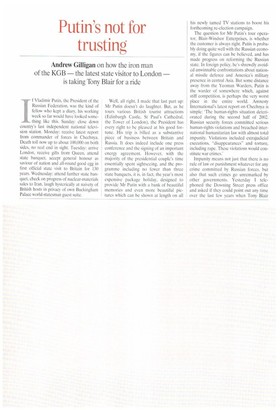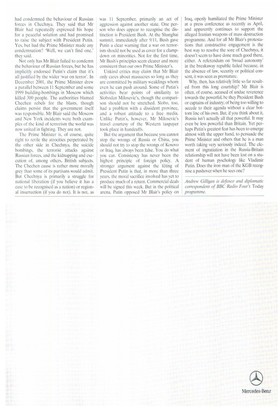Putin's not for trusting
Andrew Gilligan on how the iron man of the KGB — the latest state visitor to London — is taking Tony Blair for a ride 1 f Vladimir Putin, the President of the Russian Federation, was the kind of fellow who kept a diary, his working week so far would have looked something like this. Sunday: close down country's last independent national television station. Monday: receive latest report from commander of forces in Chechnya. Death toll now up to about 100,000 on both sides, no real end in sight. Tuesday: arrive London, receive gifts from Queen, attend state banquet, accept general honour as saviour of nation and all-round good egg in first official state visit to Britain for 130 years. Wednesday: attend further state banquet, check on progress of nuclear-materials sales to Iran, laugh hysterically at naivety of British hosts in privacy of own Buckingham Palace world-statesman guest suite.
Well, all right, I made that last part up: Mr Putin doesn't do laughter. But, as he tours various British tourist attractions (Edinburgh Castle, St Paul's Cathedral. the Tower of London), the President has every right to be pleased at his good fortune. His trip is billed as a substantive piece of business between Britain and Russia. It does indeed include one press conference and the signing of an important energy agreement. However, with the majority of the presidential couple's time essentially spent sightseeing, and the programme including no fewer than three state banquets, it is, in fact, the year's most expensive package holiday, designed to provide Mr Putin with a bank of beautiful memories and even more beautiful pictures which can be shown at length on all his newly tamed TV stations to boost his forthcoming re-election campaign.
The question for Mr Putin's tour operator, Blair-Windsor Enterprises, is whether the customer is always right. Putin is probably doing quite well with the Russian economy, if the figures can be believed, and has made progress on reforming the Russian state. In foreign policy, he's shrewdly avoided unwinnable confrontations about national missile defence and America's military presence in central Asia. But some distance away from the Yeoman Warders, Putin is the warder of somewhere which, against stiff competition. is perhaps the very worst place in the entire world. Amnesty International's latest report on Chechnya is simple: 'The human-rights situation deteriorated during the second half of 2002. Russian security forces committed serious human-rights violations and breached international humanitarian law with almost total impunity. Violations included extrajudicial executions. -disappearances" and torture, including rape. These violations would constitute war crimes.'
Impunity means not just that there is no rule of law or punishment whatever for any crime committed by Russian forces, but also that such crimes go unremarked by other governments. Yesterday I telephoned the Downing Street press office and asked if they could point out any time over the last few years when Tony Blair had condemned the behaviour of Russian forces in Chechnya. They said that Mr Blair had repeatedly expressed his hope for a peaceful solution and had promised to raise the subject with President Putin. Yes, but had the Prime Minister made any condemnation? 'Well, we can't find one,' they said.
Not only has Mr Blair failed to condemn the behaviour of Russian forces, but he has implicitly endorsed Putin's claim that it's all justified by the wider 'war on terror'. In December 2001, the Prime Minister drew a parallel between 11 September and some 1999 building-bombings in Moscow which killed 300 people. The authorities blamed Chechen rebels for the blasts, though claims persist that the government itself was responsible. Mr Blair said the Moscow and New York incidents were both examples of the kind of terrorism the world was now united in fighting. They are not.
The Prime Minister is, of course, quite right to revile the atrocities perpetrated by the other side in Chechnya, the suicide bombings, the terrorist attacks against Russian forces, and the kidnapping and execution of, among others, British subjects. The Chechen cause is rather more morally grey than some of its partisans would admit. But Chechnya is primarily a struggle for national liberation (if you believe it has a case to be recognised as a nation) or regional insurrection (if you do not). It is not, as was 11 September, primarily an act of aggression against another state. One person who does appear to recognise the distinction is President Bush. At the Shanghai summit, immediately after 9/11, Bush gave Putin a clear warning that a war on terrorism should not be used as cover for a clampdown on minorities. Not for the first time, Mr Bush's principles seem clearer and more consistent than our own Prime Minister's.
Unkind critics may claim that Mr Blair only cares about massacres so long as they are committed by military weaklings whom even he can push around. Some of Putin's activities bear points of similarity to Slobodan Milosevic's, though the comparison should not be stretched. Sloho, too, had a problem with a dissident province, and a robust attitude to a free media. Unlike Putin's, however, Mr Milosevic's travel courtesy of the Western taxpayer took place in handcuffs.
But the argument that because you cannot stop the wrongs of Russia or China, you should not try to stop the wrongs of Kosovo or Iraq, has always been false. You do what you can. Consistency has never been the highest principle of foreign policy. A stronger argument against the feting of President Putin is that, in more than three years, the moral sacrifice involved has yet to produce much of a return. Commercial deals will be signed this week. But in the political arena, Putin opposed Mr Blair's policy on Iraq, openly humiliated the Prime Minister at a press conference as recently as April, and apparently continues to support the alleged Iranian weapons of mass destruction programme. And for all Mr Blair's protestations that constructive engagement is the best way to resolve the sore of Chechnya, it doesn't seem to have done much good there, either. A referendum on 'broad autonomy' in the breakaway republic failed because, in the absence of law, security or political consent, it was seen as premature.
Why, then, has relatively little so far resulted from this long courtship? Mr Blair is often, of course, accused of undue reverence towards the powerful, be they President Bush or captains of industry; of being too willing to accede to their agenda without a clear bottom line of his own. But, if you think about it, Russia isn't actually all that powerful. It may even be less powerful than Britain. Yet perhaps Putin's greatest feat has been to emerge almost with the upper hand, to persuade the Prime Minister and others that he is a man worth taking veg seriously indeed. The element of ingratiation in the Russia-Britain relationship will not have been lost on a student of human pyschology like Vladimir Putin. Does the iron man of the KGB recognise a pushover when he sees one?
Andrew Gilligan is defence and diplomatic correspondent of BBC Radio Four's Today programme.



































































 Previous page
Previous page